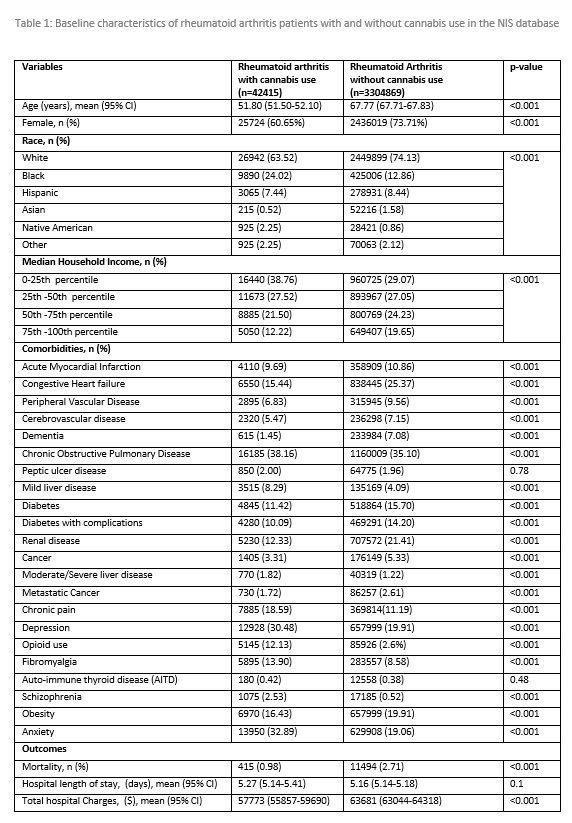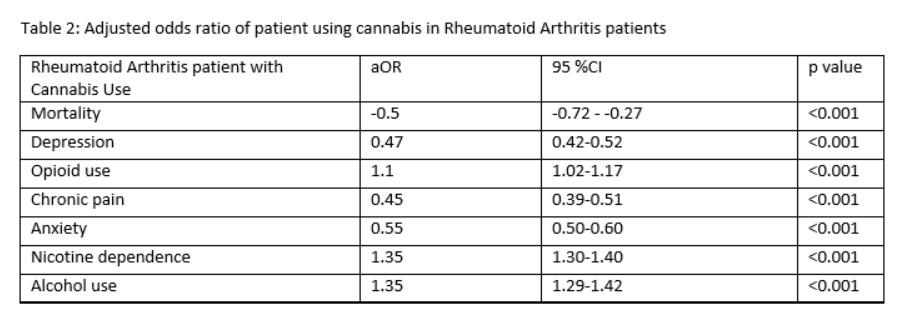Session Information
Session Type: Poster Session A
Session Time: 10:30AM-12:30PM
Background/Purpose: Despite advancements in rheumatoid arthritis (RA) treatment, effective pain management remains challenging, with many patients also experiencing insomnia, anxiety, and depression. As cannabis legalization grows across the globe, its use recreationally and medically is increasing. Cannabis, with its immunomodulatory and analgesic effects, offers a promising non-opioid alternative. This study uses the National Inpatient Sample (NIS) database to evaluate outcomes in hospitalized RA patients using cannabis.
Methods: A retrospective cross-sectional study was conducted using data from the National Inpatient Sample (2016-2021). International Statistical Classification of Diseases (ICD-10) codes were employed to identify primary and secondary diagnoses. All adult patients ( >18 years of age) with a diagnosis of RA were included in the study. We compared the demographics, baseline clinical characteristics, comorbidities, and inpatient outcomes, including mortality, hospital length of stay, total hospital charges, were compared in patients with or without cannabis use. Statistical analysis was performed using STATA v.17.
Results: Rheumatoid arthritis patients using cannabis (n=42,415) were significantly younger (mean age 51.80 vs. 67.77 years) and had a lower proportion of females (60.65% vs. 73.71%) compared to non-users (n=3,304,869). Cannabis users were more likely to be Black (24.02% vs. 12.86%) and Native American (2.25% vs. 0.86%) but less likely to be White (63.52% vs. 74.13%). They were also more commonly in the lowest income quartile (38.76% vs. 29.07%). Mortality was significantly lower among cannabis users (0.98% vs. 2.71%), and they incurred lower total hospital charges ($57,773 vs. $63,681), with no significant difference in hospital length of stay.
After adjusting for age, gender, race and co-morbidities; cannabis use in rheumatoid arthritis patient were associated with a significant decrease in mortality (OR: -0.5, 95% CI: -0.72 to -0.27), depression (OR: 0.47, 95% CI: 0.42-0.52), chronic pain (OR: 0.45, 95% CI: 0.39-0.51), and anxiety (OR: 0.55, 95% CI: 0.50-0.60). Conversely, cannabis use was associated with an increased risk of opioid use (OR: 1.1, 95% CI: 1.02-1.17, nicotine dependence (OR: 1.35, 95% CI: 1.30-1.40), and alcohol use (OR: 1.35, 95% CI: 1.29-1.42).
Conclusion: This study found that rheumatoid arthritis (RA) patients using cannabis were younger, more often male, and more likely to be Black or Native American. Patient with RA with cannabis were found to have low rate of mortality, depression, chronic pain, and anxiety. However, they also had increased risks of opioid use, nicotine dependence, and alcohol use. More research is needed on the long-term effects of cannabis in RA patients and the population at risk of dependency should be monitored closely.
To cite this abstract in AMA style:
Shrestha K, Subedi P, Ghimire M, Poudel S, Parvathaneni K, Hashim M, Ghimire K, Pandey O, Hasan M, Tagoe C, Gandrabur L. Inpatient Outcomes of Rheumatoid Arthritis in Hospitalized Patients Using Cannabis: Data from the National Inpatient Sample [abstract]. Arthritis Rheumatol. 2024; 76 (suppl 9). https://acrabstracts.org/abstract/inpatient-outcomes-of-rheumatoid-arthritis-in-hospitalized-patients-using-cannabis-data-from-the-national-inpatient-sample/. Accessed .« Back to ACR Convergence 2024
ACR Meeting Abstracts - https://acrabstracts.org/abstract/inpatient-outcomes-of-rheumatoid-arthritis-in-hospitalized-patients-using-cannabis-data-from-the-national-inpatient-sample/


